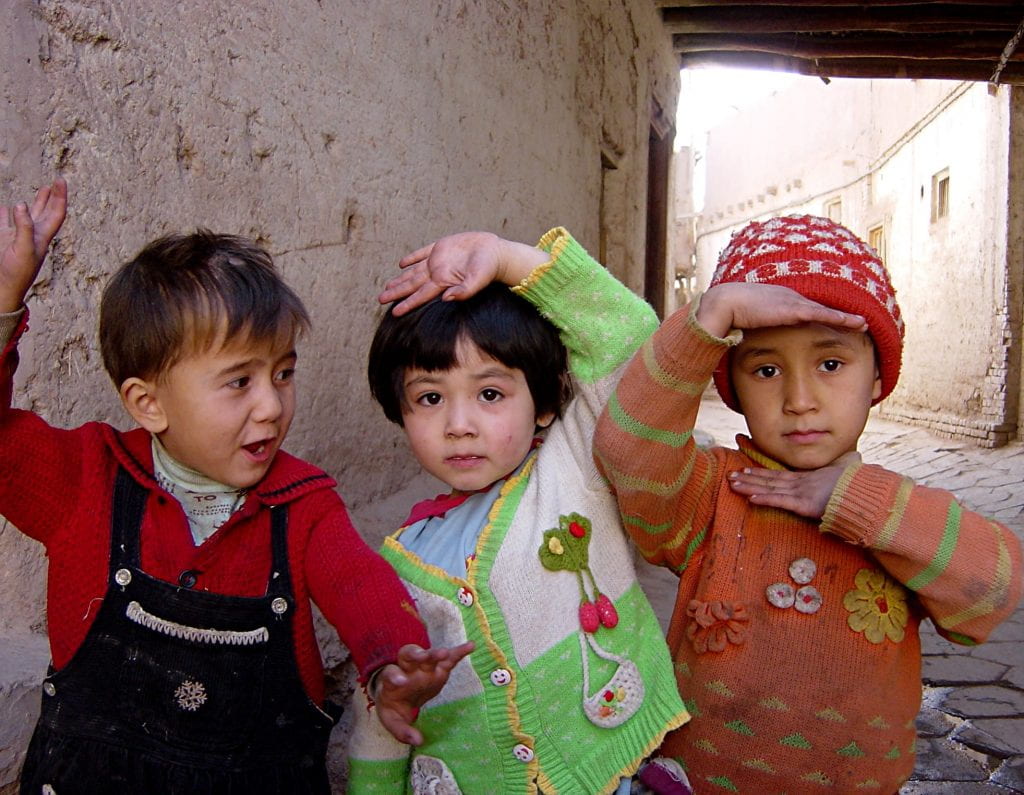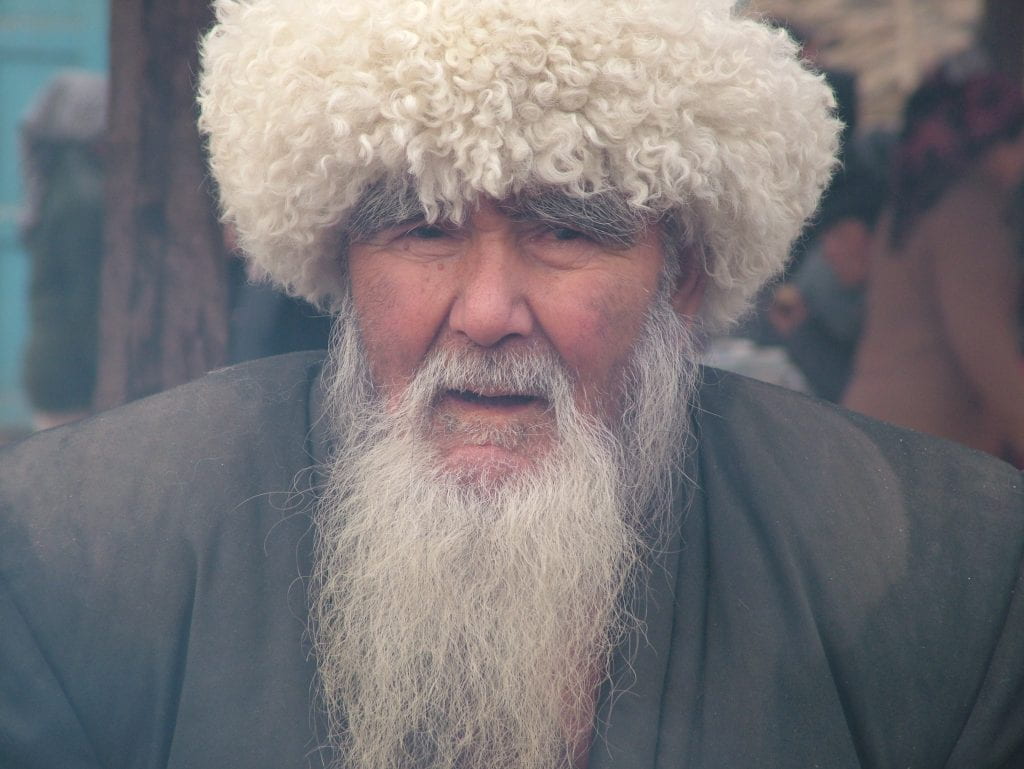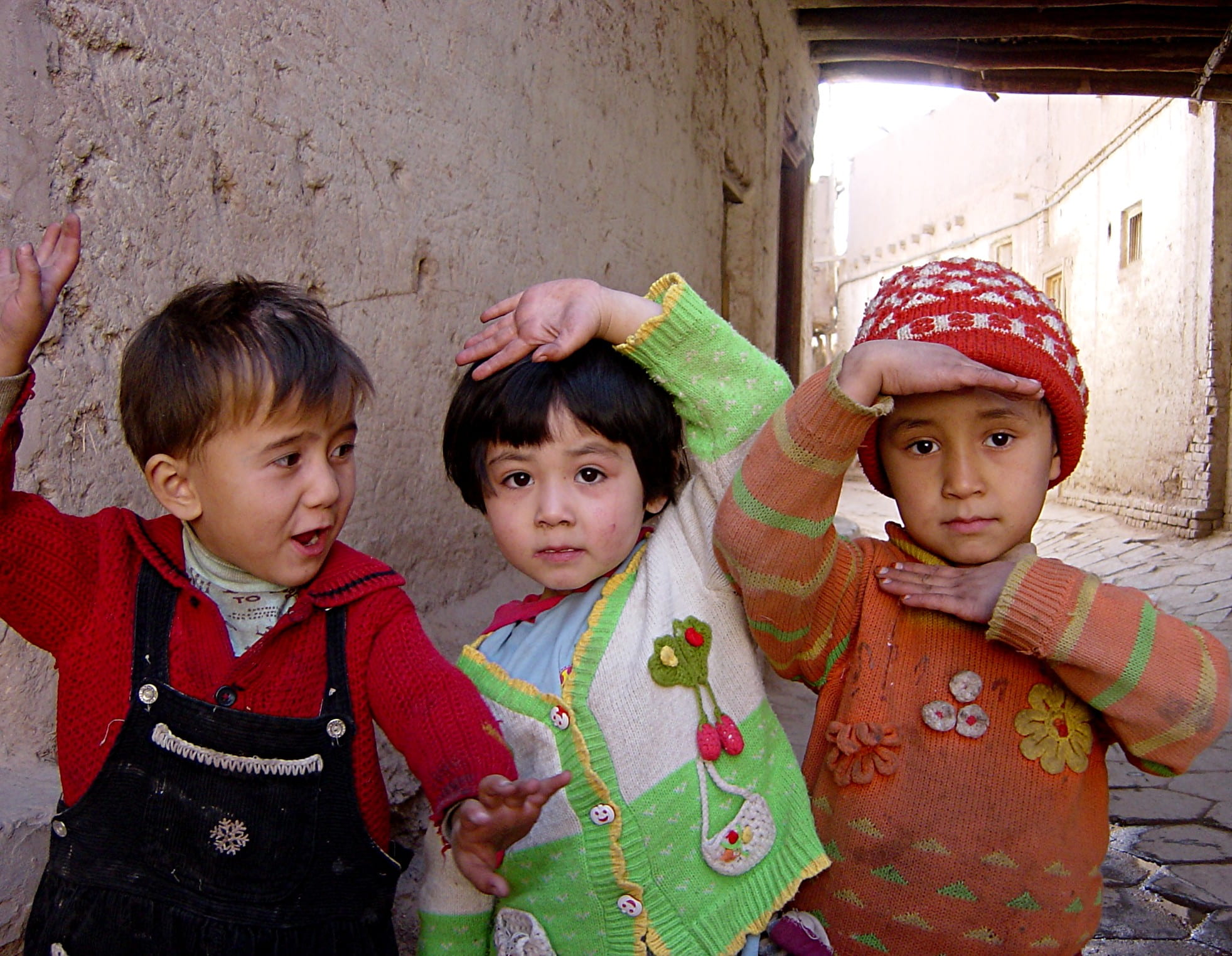by Dianna Bai

Among the corpses frozen in exodus over the icy mountain pass, will you recognize me? Our brothers
we begged for shelter took our clothes. Pass by there even now and you will see our naked
corpses. When they force me to accept the massacre as love
Do you know that I am with you. Perhat Tursun, translated by Joshua L. Freeman
In the arid and ashen deserts of Xinjiang, the northwestern province of China, as many as 1 million Uyghurs have been detained in internment camps by the Chinese government for mandatory “re-education.” Scores of the compounds can be seen vividly from satellite images. Enclosed by concrete walls, barbed wire, and guard stations, they have the imposing sterility of prisons. Inside, the detainees, Uyghurs, and members of a few other ethnic groups who practice the Muslim faith, are forced to participate in a program of indoctrination, listening to lectures, singing songs that praise the Communist Party of China, and writing essays of “self-criticism.” They are also coerced into abandoning traditional practices tied to Islam: praying, growing a beard, wearing a headscarf, and abstaining from pork and alcohol.
The stated aim of the campaign is to eliminate extremism in a region that has been marked by unrest and separatist violence, to produce “transformation by education.” One revealing official document reviewed by Agence-France Press states that to produce this change, the centers must “break their lineage, break their roots, break their connections, and break their origins.” It’s clear that in Xinjiang, China has gone far beyond fighting separatism and works actively to erase a great cultural tradition for the purposes of political stability. The mass detention underway is a reflection of the Xi Jinping government, a nationalistic, hardline regime that often glorifies the practices of the Mao years. During the Cultural Revolution from 1966-1976, millions of youth from Chinese cities were sent to the countryside for “re-education.” The recent spate of mass detentions should come as no surprise.
Who are the Uyghurs in Xinjiang?
Xinjiang is a province in China that borders Kazakhstan, Kyrgyzstan, and Mongolia. China is dominated by the Han majority, which comprises over 90 percent of the population, but is also home to 55 ethnic minorities. About 10 million Muslim Uyghurs (and other Muslim minorities) live in the Xinjiang province. The Uyghurs, who feel a stronger kinship with the peoples of Central Asia than with the Han Chinese, speak a distinct Turkic language similar to Uzbek and practice a form of Sunni Islam. They have left a distinct mark on the history of Inner Asia, having ruled their own kingdom that stretched from Manchuria to the Caspian Sea in the eighth and ninth centuries but is now concentrated in Xinjiang. Since the Communist Party took over China in 1949, Xinjiang has been ruled by China as an “autonomous” region that is not truly autonomous. Freedoms and liberties for the Uyghurs have been curtailed heavily – the recent mass detentions are only a piece of the larger picture of repression that Uyghurs face.
Uyghurs are divided in opinion over their political autonomy. Some support remaining a distinct culture within the Xinjiang Autonomous Region or integrating into the Chinese system, while others call for becoming a separate state called “East Turkestan.” For China, Xinjiang is an important province, the biggest domestic producer of oil and gas that is also a critical logistics hub for the “Belt and Road Initiative,” an ambitious trillion dollar infrastructure plan meant to strengthen China’s global influence. China is also concerned that unrest in Xinjiang will spark unrest in other provinces such as Tibet, Inner Mongolia, and Taiwan.
The brutal measures toward the Muslims in Xinjiang are only one aspect of the broader repression levied against religious groups in China under Xi Jinping. The U.S. State Department has long designated China as a “particular country of concern” with regards to religious freedom. An authoritarian state that fears the rise of civil society, China has placed restrictions on all religious groups—from the Tibetan Buddhists to Christians to Falun Gong practitioners. Throughout the history of the PRC, the state has been monitoring the activities of major religious organizations and even banning groups such as the popular spiritual movement Falun Gong, which had gained approximately 70 million followers in China before it was declared illegal. On the Tibetan plateau, where there are six million adherents of Tibetan Buddhism and its exiled spiritual leader, the Dalai Lama, we see some of the most extreme measures. Paramilitary police patrol the streets to monitor the movements ethnic Tibetans, reinforced by a fleet of video cameras recording all events for review. The “grid management” system that Xinjiang now employs was tried and tested first in Tibet, where an army of community workers oversee sections of the city divided into “grids” to provide security officials with real-time data that could uncover the first signs of potential unrest.
Since Xi Jinping has consolidated power, the crackdown on religion has intensified. The uptick in repression has been especially visible for Protestant churches and quasi-Christian groups since 2016. Reports from Christians in China tell of an alarming increase in Bibles burned, churches demolished, and pastors detained. As Heritage Foundation fellow Olivia Enos explains, “I think that the Chinese government, like so many authoritarian governments around the world, recognizes that religion gives an alternative authority to the government and it requires the allegiance of the people to an authority that is, frankly, far higher than the government.”

A Police State Emerges in Xinjiang
Maintaining political stability in Xinjiang has been paramount for China, especially as discontent has flared up in recent years. As Xinjiang has developed economically since 1949, the government has encouraged the migration of Han Chinese into the region. Tensions have arisen as many Uyghurs resent discrimination by the government and the Han Chinese. Uyghurs have watched the higher paying jobs go to the ethnically Han Chinese while the Uyghur “minorities” have been given the labor-intensive jobs for lesser pay. Long-simmering tensions exploded in 2008 and 2009 when thousands of Uyghurs took to the streets to riot in Xinjiang over the unfair treatment by the government and the Han Chinese.
Blaming the 2008 and 2009 riots on Uyghur separatists, China has since implemented increasingly repressive policies to control the Uyghurs in Xinjiang under the guise of combating terrorism and extremism. Several Uyghur-led rebellions against the Chinese government have punctuated the history of Xinjiang, dating back to the early 1900s. During the Qing Dynasty, the imperial government’s attempt to assimilate the Uyghur people into China created antagonism between Uyghurs and the Chinese government that became a foundation of the newly formed Uyghur identity. Today, there also exist extreme separatist groups in Xinjiang with ties to global jihad, including the Turkestan Islamic Party, which took credit for a series of attacks in 2008. In one sense, it is easy to see why the current government of China would be vigilant about violence and ensuring that the Uyghurs never rise up again as they have in history. They fear that China will splinter if regional separatist movements gain traction and inspire each other. Yet China has gone far beyond fighting the perceived threat, now detaining innocent people and infringing on so many aspects of their daily lives.
The brutal repression of the Uyghurs expanded dramatically in 2016 with the installation of a new Party chief, Chen Quanguo, who has brought his experience quelling unrest as the former Party chief of Tibet. In 2017, Xinjiang’s security spending increased by more than 90 percent to $8.52 billion. Xinjiang is now a police state where the government intrudes into many aspects of people’s lives. According to one detailed report that summarizes the findings of numerous accounts in the media:
- “Uyghurs have been banned from fasting during Ramadan, refusing to eat pork, refusing to wear shorts, refusing to watch state TV or listen to state radio, wearing burqas, having “abnormal” beards, performing traditional funeral rites, speaking to family members overseas, travelling overseas, and giving their children Islamic names such as Mohammad and Fatima.”
- Chinese flags and Communist slogans have been installed in mosques.
- “Convenience police stations” have been set up every 500 meters in the capital city of Urumqi
- Local officials have been required to “live, eat, and study” with local families.
- Volunteers are assigned households to monitor. They are charged with finding out what organizations people belong and “the sort of lives they lead” including their political opinions.
- 40,000 face-recognition cameras have been installed to track Uyghurs
- All drivers in Xinjiang have been required to install GPS trackers in their cars that will monitor their movements
- Police have taken voice samples, DNA samples, fingerprints, and iris scans.
- Uyghurs are regularly required to have their ID cards checked doing typical activities in a day such as traveling and filling up gas.
Perhaps the most drastic measures have been the mass detentions. Uyghurs who have committed no crime other than practicing their religion – activities such as reading an Islamic verse at a funeral or making a pilgrimage to Mecca – have been arbitrarily detained in Xinjiang. As former detainees tell their stories, the world has gotten a sense of what takes place inside of the camps. It’s not the sunny “vocational education” that Chinese officials and state television have propagated. Part of the detention involves education: former detainees have described being taught daily lessons in Pinyin, the Romanized system of Chinese. Other lessons are less innocuous—songs praising Xi Jinping, curriculum about the hero Lei Feng to inspire devotion to communism. Detainees have reported being forced to recite “126 lies” about religion. “Religion is opium, religion is bad, you must believe in no religion, you must believe in the Communist Party,” one former detainee remembers.
The use of force is not uncommon in the camps. Official documents obtained about the camps include a procurement order for 2,768 police batons, 550 electric cattle prods, 1,367 pairs of handcuffs, and 2,792 cans of pepper spray. Another detainee has told the BBC that they were forced to wake before sunrise every morning for mandatory runs. Those who didn’t run fast enough were beaten and kicked by guards. More beatings were in store for detainees who couldn’t recite correctly the laws they were forced to memorize. In one case, an ethnically Kazakh man who had been detained revealed to NPR that he had been tortured for resisting the orders of a guard to make his bed and throwing the mattress at the guard—though he was the only one at his camp to actually be tortured rather than just threatened. He’d been forced to wear a suit made of metal weighing over 50 lbs that stretched out his limbs and caused him immense pain in his back. “They made people wear this thing to break their spirits,” he told NPR. “After 12 hours, I became so soft, quiet and lawful.”
The humanitarian crisis against Muslims in Xinjiang can hold lessons for the United States as well, especially with regards to the recent travel ban against five Muslim majority countries. In the name of national security, China has swept a broad swath of society into one vilified category and carried out massive human rights violations against their own citizens on the basis of faith. China doesn’t honor religious freedom or the rights of minorities. To the Chinese government, there is no sense that these rights should be protected when larger objectives are at stake. These protections, however, are a defining characteristic of the United States as a democracy. In the words of the Declaration of Independence, all men are created equal. Honoring the fundamental rights of one group means honoring the rights of all. It ensures that there will be no “tyranny of the majority.” While the travel ban does not compare to the vast violation of civil liberties in China, it undermines the spirit of democracy and contributes to the widespread prejudice and discrimination against people of religious faith in America.
Dianna Bai is a Birmingham-based writer who currently writes for AL.com. Her writing has been featured on Forbes, TechCrunch, and Medium. You can find her portfolio here.

